University Name COMR2010 Reflective Journal Part A: Cultural Diversity
VerifiedAdded on 2022/08/11
|6
|1414
|22
Journal and Reflective Writing
AI Summary
This reflective journal, part of the COMR2010 Cultural Diversity course, delves into the student's reflections on intercultural competence, globalization, and cultural awareness. The journal entry explores the evolution of the student's understanding of cultural concepts like ethnicity, identity, and communication. It examines the impact of globalization on cultural dynamics and the increasing importance of cultural competence in personal and professional contexts. The student reflects on their initial perceptions, learning experiences within the course modules, and how these new insights have challenged and reshaped their existing knowledge and assumptions. The journal also addresses the practical implications of this learning, including the need for further development in areas such as language proficiency and cultural intelligence, and how these skills can be applied in future interactions and career development. The student emphasizes the importance of empathy, patience, and the ability to recognize and address personal biases in fostering effective intercultural communication.
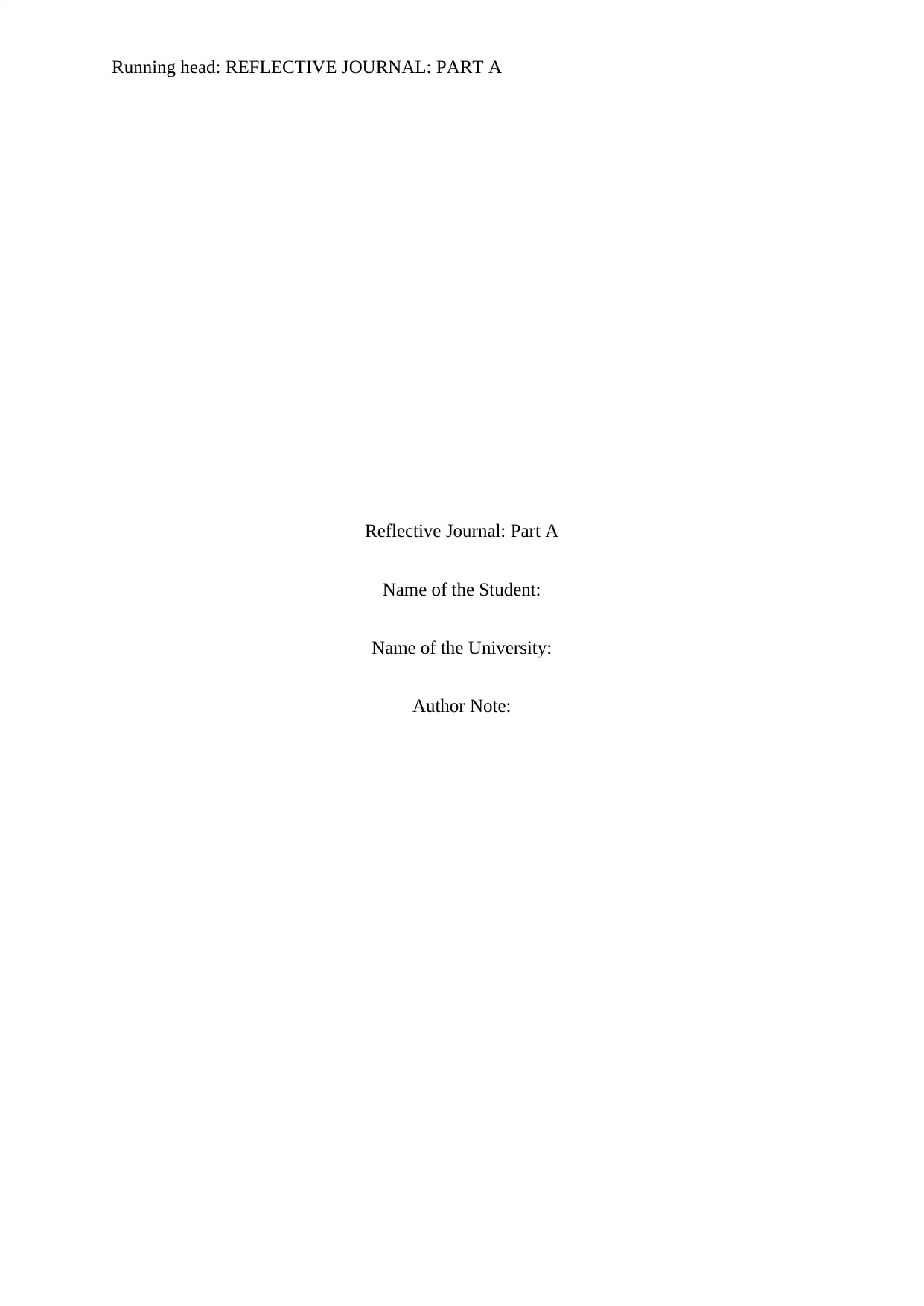
Running head: REFLECTIVE JOURNAL: PART A
Reflective Journal: Part A
Name of the Student:
Name of the University:
Author Note:
Reflective Journal: Part A
Name of the Student:
Name of the University:
Author Note:
Paraphrase This Document
Need a fresh take? Get an instant paraphrase of this document with our AI Paraphraser
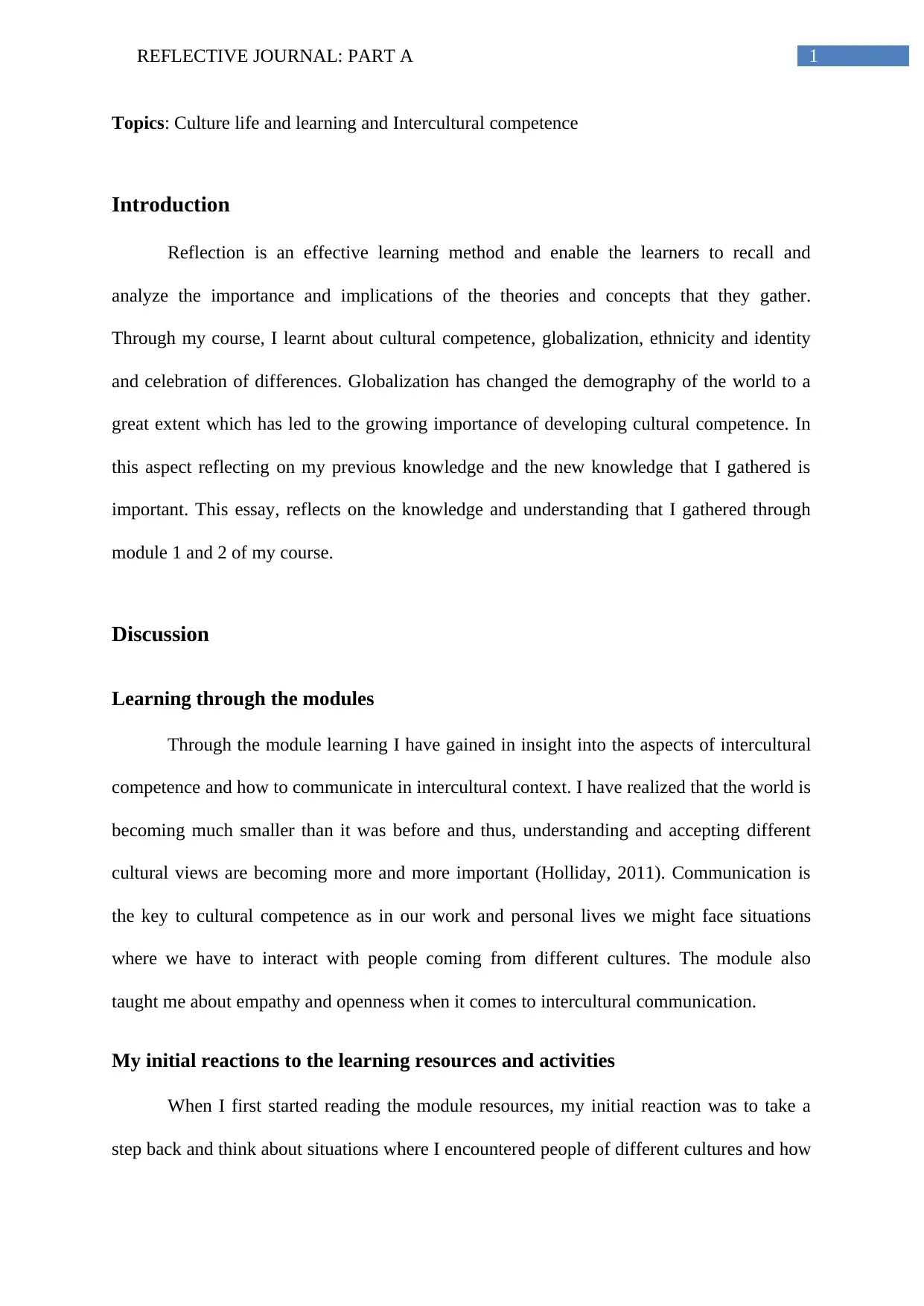
1REFLECTIVE JOURNAL: PART A
Topics: Culture life and learning and Intercultural competence
Introduction
Reflection is an effective learning method and enable the learners to recall and
analyze the importance and implications of the theories and concepts that they gather.
Through my course, I learnt about cultural competence, globalization, ethnicity and identity
and celebration of differences. Globalization has changed the demography of the world to a
great extent which has led to the growing importance of developing cultural competence. In
this aspect reflecting on my previous knowledge and the new knowledge that I gathered is
important. This essay, reflects on the knowledge and understanding that I gathered through
module 1 and 2 of my course.
Discussion
Learning through the modules
Through the module learning I have gained in insight into the aspects of intercultural
competence and how to communicate in intercultural context. I have realized that the world is
becoming much smaller than it was before and thus, understanding and accepting different
cultural views are becoming more and more important (Holliday, 2011). Communication is
the key to cultural competence as in our work and personal lives we might face situations
where we have to interact with people coming from different cultures. The module also
taught me about empathy and openness when it comes to intercultural communication.
My initial reactions to the learning resources and activities
When I first started reading the module resources, my initial reaction was to take a
step back and think about situations where I encountered people of different cultures and how
Topics: Culture life and learning and Intercultural competence
Introduction
Reflection is an effective learning method and enable the learners to recall and
analyze the importance and implications of the theories and concepts that they gather.
Through my course, I learnt about cultural competence, globalization, ethnicity and identity
and celebration of differences. Globalization has changed the demography of the world to a
great extent which has led to the growing importance of developing cultural competence. In
this aspect reflecting on my previous knowledge and the new knowledge that I gathered is
important. This essay, reflects on the knowledge and understanding that I gathered through
module 1 and 2 of my course.
Discussion
Learning through the modules
Through the module learning I have gained in insight into the aspects of intercultural
competence and how to communicate in intercultural context. I have realized that the world is
becoming much smaller than it was before and thus, understanding and accepting different
cultural views are becoming more and more important (Holliday, 2011). Communication is
the key to cultural competence as in our work and personal lives we might face situations
where we have to interact with people coming from different cultures. The module also
taught me about empathy and openness when it comes to intercultural communication.
My initial reactions to the learning resources and activities
When I first started reading the module resources, my initial reaction was to take a
step back and think about situations where I encountered people of different cultures and how
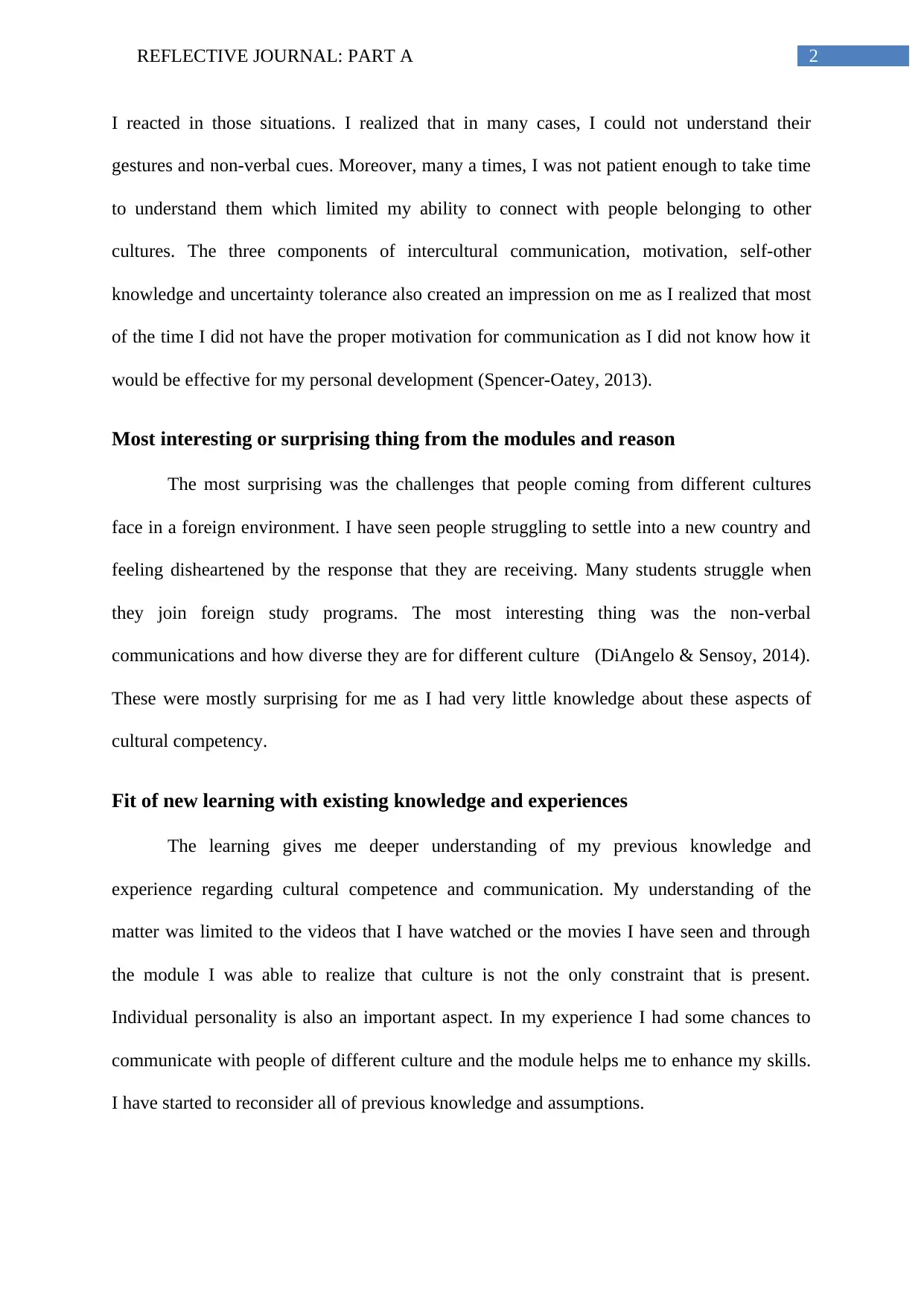
2REFLECTIVE JOURNAL: PART A
I reacted in those situations. I realized that in many cases, I could not understand their
gestures and non-verbal cues. Moreover, many a times, I was not patient enough to take time
to understand them which limited my ability to connect with people belonging to other
cultures. The three components of intercultural communication, motivation, self-other
knowledge and uncertainty tolerance also created an impression on me as I realized that most
of the time I did not have the proper motivation for communication as I did not know how it
would be effective for my personal development (Spencer-Oatey, 2013).
Most interesting or surprising thing from the modules and reason
The most surprising was the challenges that people coming from different cultures
face in a foreign environment. I have seen people struggling to settle into a new country and
feeling disheartened by the response that they are receiving. Many students struggle when
they join foreign study programs. The most interesting thing was the non-verbal
communications and how diverse they are for different culture (DiAngelo & Sensoy, 2014).
These were mostly surprising for me as I had very little knowledge about these aspects of
cultural competency.
Fit of new learning with existing knowledge and experiences
The learning gives me deeper understanding of my previous knowledge and
experience regarding cultural competence and communication. My understanding of the
matter was limited to the videos that I have watched or the movies I have seen and through
the module I was able to realize that culture is not the only constraint that is present.
Individual personality is also an important aspect. In my experience I had some chances to
communicate with people of different culture and the module helps me to enhance my skills.
I have started to reconsider all of previous knowledge and assumptions.
I reacted in those situations. I realized that in many cases, I could not understand their
gestures and non-verbal cues. Moreover, many a times, I was not patient enough to take time
to understand them which limited my ability to connect with people belonging to other
cultures. The three components of intercultural communication, motivation, self-other
knowledge and uncertainty tolerance also created an impression on me as I realized that most
of the time I did not have the proper motivation for communication as I did not know how it
would be effective for my personal development (Spencer-Oatey, 2013).
Most interesting or surprising thing from the modules and reason
The most surprising was the challenges that people coming from different cultures
face in a foreign environment. I have seen people struggling to settle into a new country and
feeling disheartened by the response that they are receiving. Many students struggle when
they join foreign study programs. The most interesting thing was the non-verbal
communications and how diverse they are for different culture (DiAngelo & Sensoy, 2014).
These were mostly surprising for me as I had very little knowledge about these aspects of
cultural competency.
Fit of new learning with existing knowledge and experiences
The learning gives me deeper understanding of my previous knowledge and
experience regarding cultural competence and communication. My understanding of the
matter was limited to the videos that I have watched or the movies I have seen and through
the module I was able to realize that culture is not the only constraint that is present.
Individual personality is also an important aspect. In my experience I had some chances to
communicate with people of different culture and the module helps me to enhance my skills.
I have started to reconsider all of previous knowledge and assumptions.
⊘ This is a preview!⊘
Do you want full access?
Subscribe today to unlock all pages.

Trusted by 1+ million students worldwide
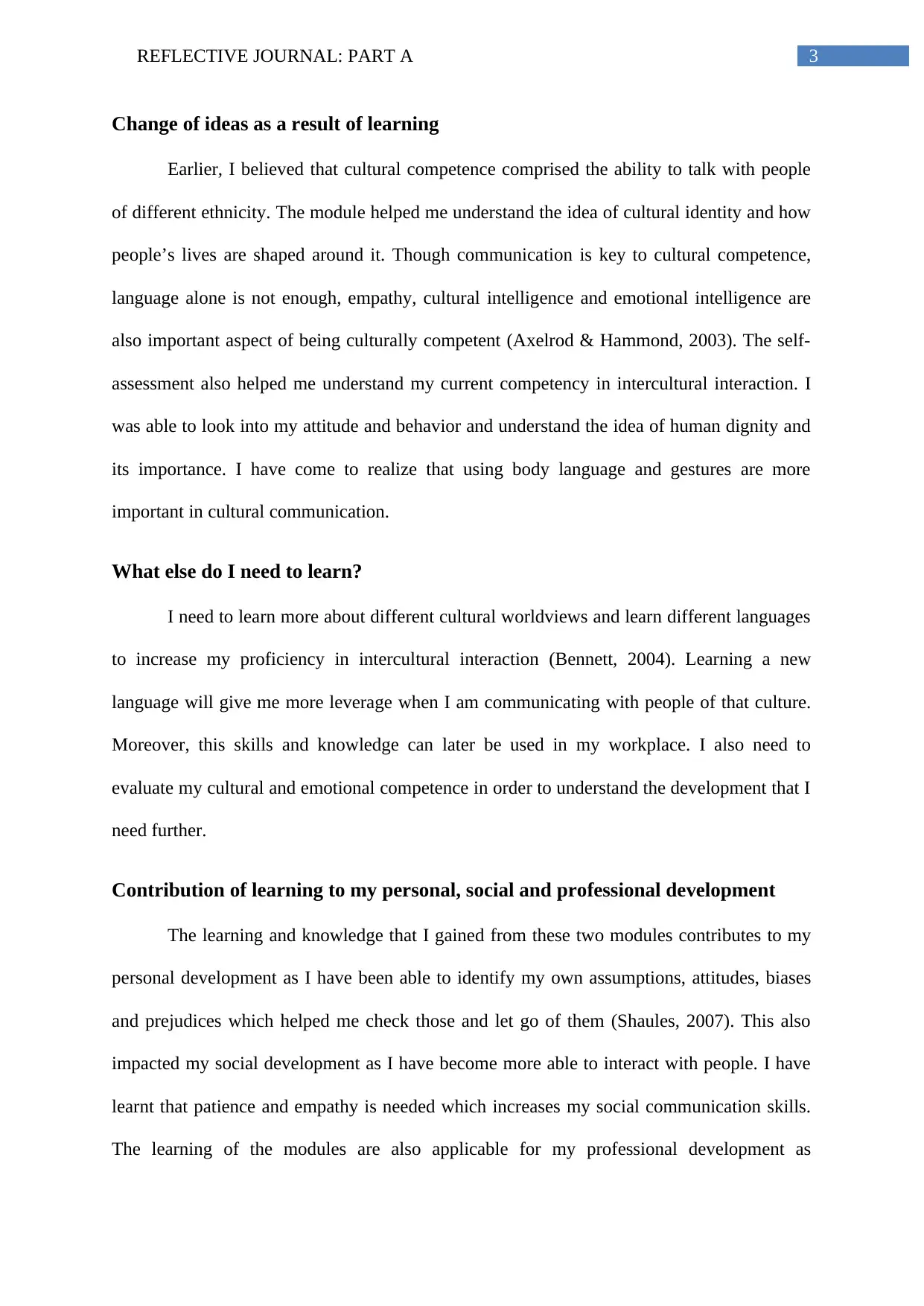
3REFLECTIVE JOURNAL: PART A
Change of ideas as a result of learning
Earlier, I believed that cultural competence comprised the ability to talk with people
of different ethnicity. The module helped me understand the idea of cultural identity and how
people’s lives are shaped around it. Though communication is key to cultural competence,
language alone is not enough, empathy, cultural intelligence and emotional intelligence are
also important aspect of being culturally competent (Axelrod & Hammond, 2003). The self-
assessment also helped me understand my current competency in intercultural interaction. I
was able to look into my attitude and behavior and understand the idea of human dignity and
its importance. I have come to realize that using body language and gestures are more
important in cultural communication.
What else do I need to learn?
I need to learn more about different cultural worldviews and learn different languages
to increase my proficiency in intercultural interaction (Bennett, 2004). Learning a new
language will give me more leverage when I am communicating with people of that culture.
Moreover, this skills and knowledge can later be used in my workplace. I also need to
evaluate my cultural and emotional competence in order to understand the development that I
need further.
Contribution of learning to my personal, social and professional development
The learning and knowledge that I gained from these two modules contributes to my
personal development as I have been able to identify my own assumptions, attitudes, biases
and prejudices which helped me check those and let go of them (Shaules, 2007). This also
impacted my social development as I have become more able to interact with people. I have
learnt that patience and empathy is needed which increases my social communication skills.
The learning of the modules are also applicable for my professional development as
Change of ideas as a result of learning
Earlier, I believed that cultural competence comprised the ability to talk with people
of different ethnicity. The module helped me understand the idea of cultural identity and how
people’s lives are shaped around it. Though communication is key to cultural competence,
language alone is not enough, empathy, cultural intelligence and emotional intelligence are
also important aspect of being culturally competent (Axelrod & Hammond, 2003). The self-
assessment also helped me understand my current competency in intercultural interaction. I
was able to look into my attitude and behavior and understand the idea of human dignity and
its importance. I have come to realize that using body language and gestures are more
important in cultural communication.
What else do I need to learn?
I need to learn more about different cultural worldviews and learn different languages
to increase my proficiency in intercultural interaction (Bennett, 2004). Learning a new
language will give me more leverage when I am communicating with people of that culture.
Moreover, this skills and knowledge can later be used in my workplace. I also need to
evaluate my cultural and emotional competence in order to understand the development that I
need further.
Contribution of learning to my personal, social and professional development
The learning and knowledge that I gained from these two modules contributes to my
personal development as I have been able to identify my own assumptions, attitudes, biases
and prejudices which helped me check those and let go of them (Shaules, 2007). This also
impacted my social development as I have become more able to interact with people. I have
learnt that patience and empathy is needed which increases my social communication skills.
The learning of the modules are also applicable for my professional development as
Paraphrase This Document
Need a fresh take? Get an instant paraphrase of this document with our AI Paraphraser
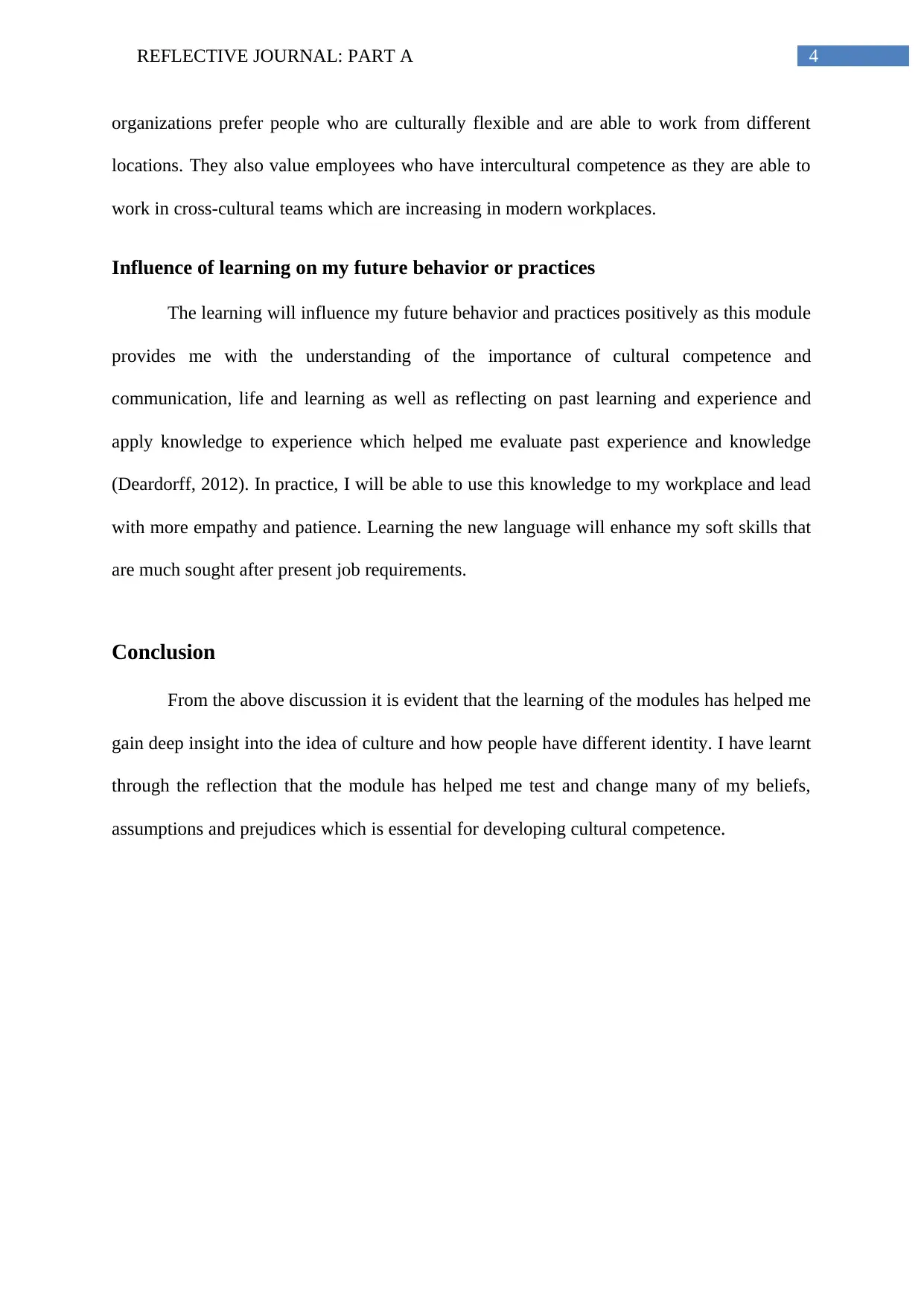
4REFLECTIVE JOURNAL: PART A
organizations prefer people who are culturally flexible and are able to work from different
locations. They also value employees who have intercultural competence as they are able to
work in cross-cultural teams which are increasing in modern workplaces.
Influence of learning on my future behavior or practices
The learning will influence my future behavior and practices positively as this module
provides me with the understanding of the importance of cultural competence and
communication, life and learning as well as reflecting on past learning and experience and
apply knowledge to experience which helped me evaluate past experience and knowledge
(Deardorff, 2012). In practice, I will be able to use this knowledge to my workplace and lead
with more empathy and patience. Learning the new language will enhance my soft skills that
are much sought after present job requirements.
Conclusion
From the above discussion it is evident that the learning of the modules has helped me
gain deep insight into the idea of culture and how people have different identity. I have learnt
through the reflection that the module has helped me test and change many of my beliefs,
assumptions and prejudices which is essential for developing cultural competence.
organizations prefer people who are culturally flexible and are able to work from different
locations. They also value employees who have intercultural competence as they are able to
work in cross-cultural teams which are increasing in modern workplaces.
Influence of learning on my future behavior or practices
The learning will influence my future behavior and practices positively as this module
provides me with the understanding of the importance of cultural competence and
communication, life and learning as well as reflecting on past learning and experience and
apply knowledge to experience which helped me evaluate past experience and knowledge
(Deardorff, 2012). In practice, I will be able to use this knowledge to my workplace and lead
with more empathy and patience. Learning the new language will enhance my soft skills that
are much sought after present job requirements.
Conclusion
From the above discussion it is evident that the learning of the modules has helped me
gain deep insight into the idea of culture and how people have different identity. I have learnt
through the reflection that the module has helped me test and change many of my beliefs,
assumptions and prejudices which is essential for developing cultural competence.
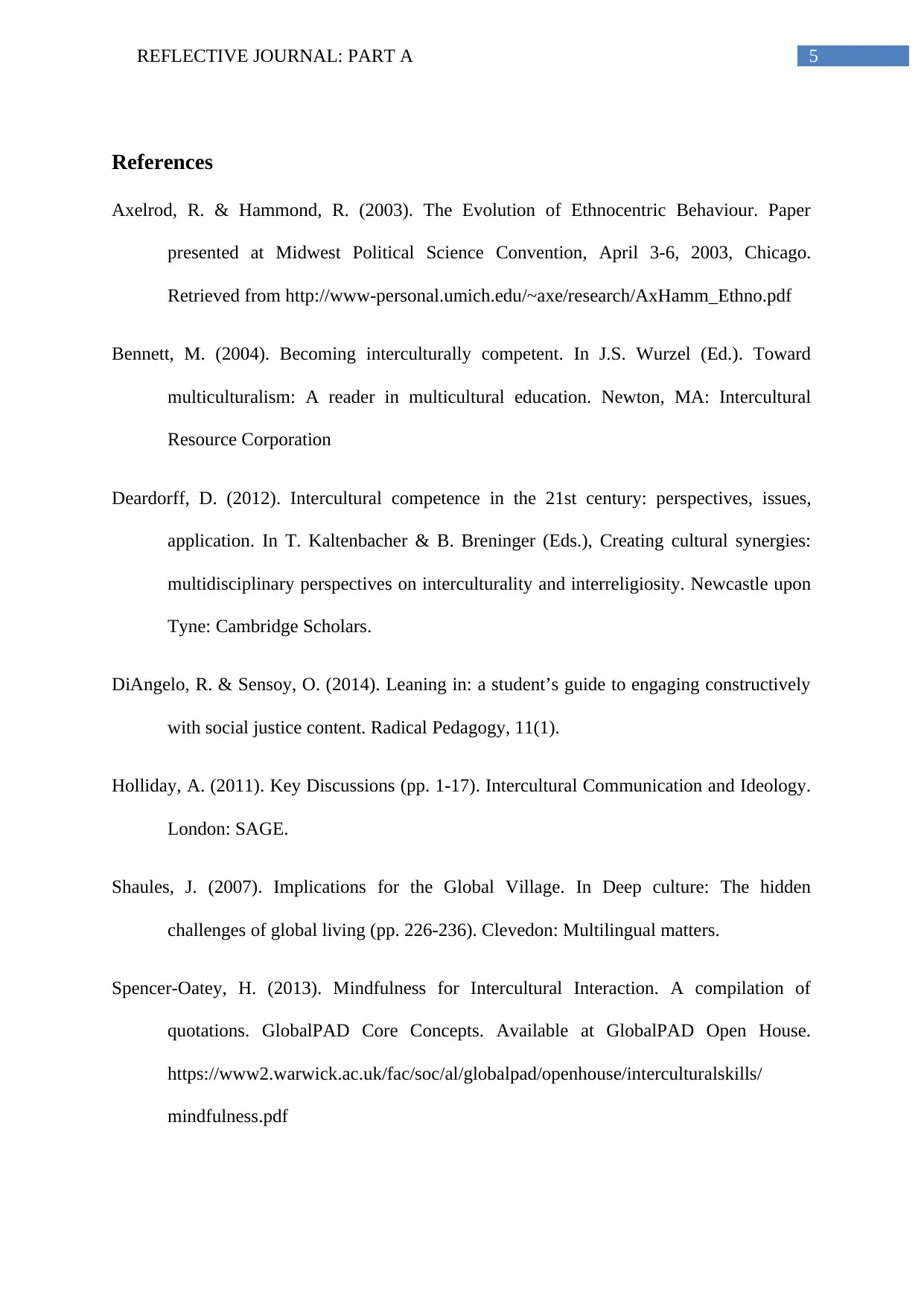
5REFLECTIVE JOURNAL: PART A
References
Axelrod, R. & Hammond, R. (2003). The Evolution of Ethnocentric Behaviour. Paper
presented at Midwest Political Science Convention, April 3-6, 2003, Chicago.
Retrieved from http://www-personal.umich.edu/~axe/research/AxHamm_Ethno.pdf
Bennett, M. (2004). Becoming interculturally competent. In J.S. Wurzel (Ed.). Toward
multiculturalism: A reader in multicultural education. Newton, MA: Intercultural
Resource Corporation
Deardorff, D. (2012). Intercultural competence in the 21st century: perspectives, issues,
application. In T. Kaltenbacher & B. Breninger (Eds.), Creating cultural synergies:
multidisciplinary perspectives on interculturality and interreligiosity. Newcastle upon
Tyne: Cambridge Scholars.
DiAngelo, R. & Sensoy, O. (2014). Leaning in: a student’s guide to engaging constructively
with social justice content. Radical Pedagogy, 11(1).
Holliday, A. (2011). Key Discussions (pp. 1-17). Intercultural Communication and Ideology.
London: SAGE.
Shaules, J. (2007). Implications for the Global Village. In Deep culture: The hidden
challenges of global living (pp. 226-236). Clevedon: Multilingual matters.
Spencer-Oatey, H. (2013). Mindfulness for Intercultural Interaction. A compilation of
quotations. GlobalPAD Core Concepts. Available at GlobalPAD Open House.
https://www2.warwick.ac.uk/fac/soc/al/globalpad/openhouse/interculturalskills/
mindfulness.pdf
References
Axelrod, R. & Hammond, R. (2003). The Evolution of Ethnocentric Behaviour. Paper
presented at Midwest Political Science Convention, April 3-6, 2003, Chicago.
Retrieved from http://www-personal.umich.edu/~axe/research/AxHamm_Ethno.pdf
Bennett, M. (2004). Becoming interculturally competent. In J.S. Wurzel (Ed.). Toward
multiculturalism: A reader in multicultural education. Newton, MA: Intercultural
Resource Corporation
Deardorff, D. (2012). Intercultural competence in the 21st century: perspectives, issues,
application. In T. Kaltenbacher & B. Breninger (Eds.), Creating cultural synergies:
multidisciplinary perspectives on interculturality and interreligiosity. Newcastle upon
Tyne: Cambridge Scholars.
DiAngelo, R. & Sensoy, O. (2014). Leaning in: a student’s guide to engaging constructively
with social justice content. Radical Pedagogy, 11(1).
Holliday, A. (2011). Key Discussions (pp. 1-17). Intercultural Communication and Ideology.
London: SAGE.
Shaules, J. (2007). Implications for the Global Village. In Deep culture: The hidden
challenges of global living (pp. 226-236). Clevedon: Multilingual matters.
Spencer-Oatey, H. (2013). Mindfulness for Intercultural Interaction. A compilation of
quotations. GlobalPAD Core Concepts. Available at GlobalPAD Open House.
https://www2.warwick.ac.uk/fac/soc/al/globalpad/openhouse/interculturalskills/
mindfulness.pdf
⊘ This is a preview!⊘
Do you want full access?
Subscribe today to unlock all pages.

Trusted by 1+ million students worldwide
1 out of 6
Related Documents
Your All-in-One AI-Powered Toolkit for Academic Success.
+13062052269
info@desklib.com
Available 24*7 on WhatsApp / Email
![[object Object]](/_next/static/media/star-bottom.7253800d.svg)
Unlock your academic potential
Copyright © 2020–2026 A2Z Services. All Rights Reserved. Developed and managed by ZUCOL.





